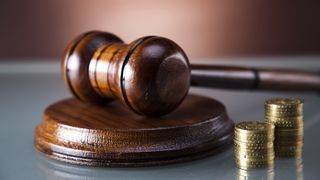Apple and Broadcom to appeal $1.1bn patent verdict
Wi-Fi lawsuit from Caltech is the sixth-largest patent award ever

Apple and Broadcom have been ordered by a US court to pay CalTech $1.1 billion in a patent infringement case, though both companies reportedly plan to appeal.
In 2016, the California Institute of Technology filed a suit claiming that Broadcom's Wi-Fi chips infringed upon its patents. Apple uses those chips in the iPhone, iPad, MacBook Air, and more.
The jury in the case was told the CalTech technology was embedded in a billion chips sold by Broadcom, half of which were in Apple devices.
"We are pleased the jury found that Apple and Broadcom infringed Caltech patents,” CalTech said in a statement. “As a non-profit institution of higher education, Caltech is committed to protecting its intellectual property in furtherance of its mission to expand human knowledge and benefit society through research integrated with education."
The suit centres on four patents used for error correction in data transmission. The legal team for Apple and Broadcom noted that the patents had only ever been licensed once previously, and that they weren't initially designed for Wi-Fi.
A witness for Caltech noted that the technology released by Broadcom after the university sued means Wi-Fi is slower and uses more power, according to a report in Law360.
Caltech's legal team calculated what royalties would have been requested had Broadcom asked to use the patent in 2010, saying it would have worked out to $1.40 for each Apple item and 26 cents for each Broadcom chip. The court awarded CalTech $837.8 million from Apple and the remaining $270.2 million from Broadcom. The award is the sixth-largest patent award ever, according to Bloomberg.
Get the ITPro. daily newsletter
Receive our latest news, industry updates, featured resources and more. Sign up today to receive our FREE report on AI cyber crime & security - newly updated for 2024.
Apple said in court documents that though it used the chips, it shouldn't be held responsible for any infringement, as it is "merely an indirect downstream party".
Broadcom, meanwhile, disagreed with the entire ruling. “While we thank the members of the jury for their service, we disagree with the factual and legal bases for the verdict and intend to appeal," the company said in a statement to Reuters.




